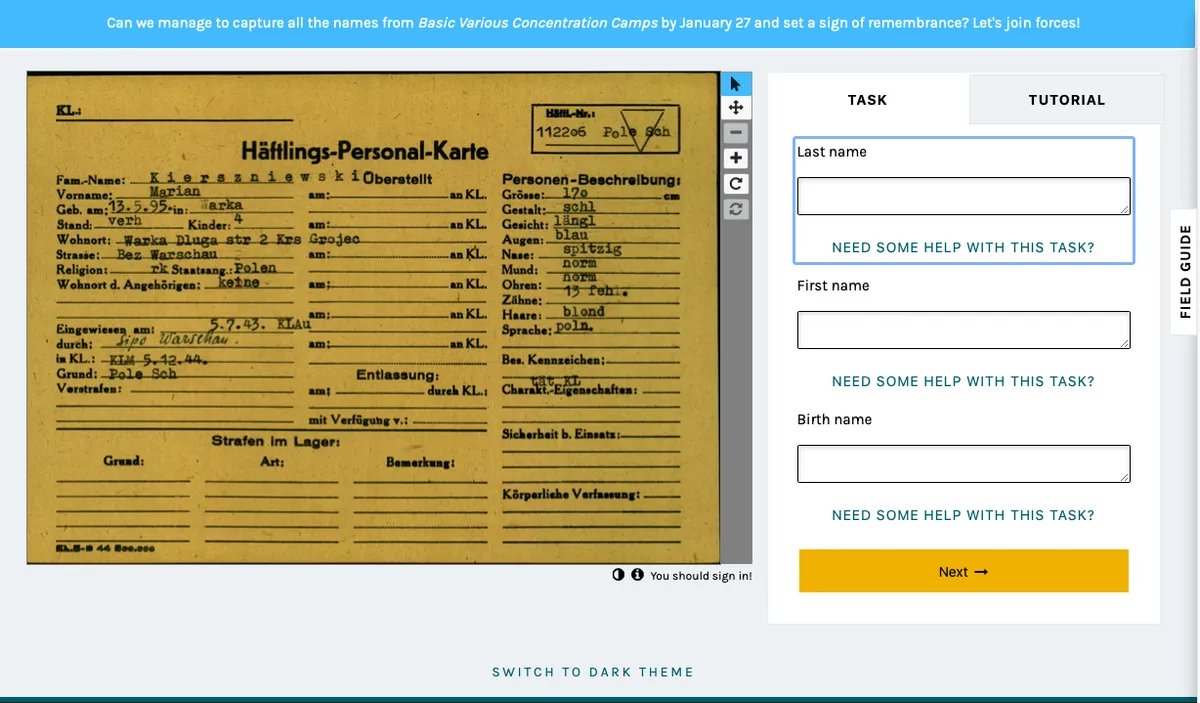About the Arolsen Archives:
The Arolsen Archives hold more than 30 million documents on Holocaust victims, concentration camp prisoners, forced laborers and survivors. It is the world’s most comprehensive collection of documents on victims of Nazi crimes. The documents bear witness to the fate of millions of people who were deported and murdered under the Nazi dictatorship from 1933 to 1945.
The collections of the Arolsen Archives were created for the International Tracing Service (ITS) to help find missing persons after the Second World War and to clarify their fate. Family members, researchers, journalists, sometimes even the survivors themselves: thousands of people from all over the world contact the Arolsen Archives every year to learn more about an individual or a special topic.
We want the unique collection of historical documents to be accessible to as many people as possible. This is why the Arolsen Archives digitised the records and started to publish them in an online archive.
About Every Name Counts:
#everynamecounts is an initiative by the Arolsen Archives, which aims to establish a digital memorial to the people persecuted by the Nazis. Anyone can donate their time and help transcribe documents about victims of Nazism.
To enable a successful search, we need metadata. The more keywords we can link to a document, the more comprehensive the subsequent search options. Of course, the names of those persecuted are of the greatest importance here. By 2025 we want all the names contained in the documents of the Arolsen Archives to be indexed.
For Transcription Tuesday on 2 February, we will focus on Prisoner Registration Cards from various concentration camps. We need your help to transcribe personal data like names and birthdates. But the cards contain much more information like transfers to or from concentration camps, reasons for the imprisonment or information about the relatives. Volunteers will get the opportunity to learn a lot about the complex system of Nazi persecution.
How to transcribe the records:
Before you start transcribing the documents, you can complete a 10-15 minute digital introduction. It revolves around the biography the 15-year-old student Siegfried Schneck, who was persecuted by the Nazis as a ‘Gypsy’ and was murdered in the Auschwitz concentration and extermination camp in 1944. This will give you a basic understanding of the rules for recording data in the #everynamecounts project and provide you with interesting background information and a practical exercise at the same time.
After finishing the introduction, you can move to #everynamecounts on the crowd-sourcing platform Zooniverse. You don’t have to be registered to transcribe the documents. But we would still recommend it – this way you can comment on the documents in our forum, get answers from our team of researchers to your questions or discuss with other volunteers.
To transcribe the records, select ‘Classify’ on the top right of the web page. You will then be shown an image of the document you are transcribing. You should enter the details from the record into the boxes on the right as instructed. If you need help with anything, click the green text underneath the box that says ‘Need some help with this task?’
If you have a problem with transcription on the day, please email ENC@arolsen-archives.org.

Whether you have 10 minutes or 10 hours to give, your contribution will make a difference. The greater the number of people who join in, the faster all the names that appear on concentration camp documents will be added to the online archive of the Arolsen Archives. Relatives and other people all over the world will then be able to research the lives of the victims.
This excerpt from a user's email shows what this can mean for a family: “My father never talked about the relatives he lost. So recovering even a name on a list is very important for us. These files add much more information. I am so appreciative of the efforts made in uploading this data.”